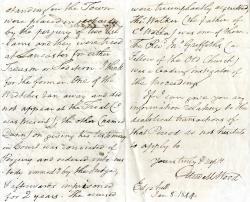
Autograph Letter Signed by Wood to unnamed recipient, recalling the Manchester treason trial of Thomas Walker and five others, 1794.
12mo, 3 pp. Bifolium. Good, on lightly-aged and creased paper. Wood begins by recalling 'the savage bigotry and infuriate hostility of the Manchestr. Tories at the time you mention towards the liberals'. He does not think an attempt was made to put the Oath of Allegiance to those on the recipient's list. 'The lives of 6-8 men of high Character and standing in the Town were placed in jeopardy by the perjury of two Villains and they were tried at Lancaster for either Treason or Sedition. I think for the former. One of the Wretches ran away and did not appear at the Trial (I was present), the other (named Dunn) on giving his testimony in Court was convicted of Perjury and ordered into custody immedy. by the Judge, & afterwards imprisoned for 2 years.' Those accused by Dunn were 'triumphantly acquitted'. Wood names the 'Revd: Jno. Griffiths (a Fellow of the Old Church)' as 'a leading instigator of the proceedings' against them. Wood concludes by offering 'any information' he can give 'relating to the diabolical transactions of that Period'. In his article 'Luddism and politics in northern counties' (1979), John Dinwiddy describes Wood as a 'wealthy Unitarian' and 'a member of a 'group of middle-class reformers'. The background of the trial is given in Walker's entry in the Oxford DNB: 'On 11 December 1792 [...] Walker's house on South Parade and the offices of the Manchester Herald were besieged by a "church and king" mob. [...] Manchester authorities and loyalists had bribed an Irish weaver and local radical named Thomas Dunn to give false evidence against Walker and, despite failing to indict him of high treason, he and nine other Manchester reformers were charged with conspiring to overthrow the king, constitution, and government. Walker, who employed the defence of Thomas Erskine and Felix Vaughan, was tried at Lancaster assizes on 2 April 1794, but he was acquitted largely on account of Dunn's perjury.'


